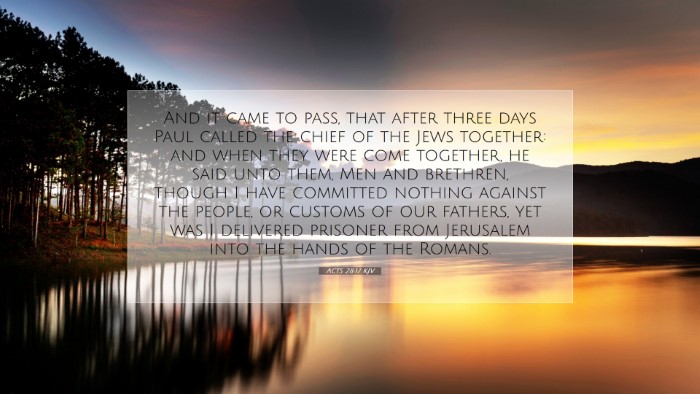Commentary on Acts 28:17
Acts 28:17 states: "And it came to pass, that after three days Paul called the chief of the Jews together: and when they were come together, he said unto them, Men and brethren, though I have committed nothing against the people, or customs of our fathers, yet was I delivered prisoner from Jerusalem into the hands of the Romans."
Contextual Overview
This verse marks a significant moment in the apostle Paul's ministry as he arrives in Rome following a perilous journey. The context of Acts 28 reveals the culmination of Paul's missionary efforts, where he is now a prisoner yet enjoys a degree of freedom. His appeal to the Jews highlights both his commitment to the Gospel and his concern for the Jewish people. Here, Paul seeks to clarify his situation and defend his mission in light of accusations leveled against him.
Insights from Public Domain Commentaries
Matthew Henry's Commentary
Prayerful Preparation: Henry emphasizes the importance of Paul's first actions upon arriving in Rome. His immediate call to the Jewish leaders demonstrates his prioritization of his ministry to the Jews, reflecting his belief that the Gospel was first for them. Henry notes that Paul's approach was both prudent and strategic, utilizing his position to witness to the very people he aimed to lead to Christ.
Defense Against Accusations: Paul’s statement regarding having committed nothing against the customs or people indicates his defense. Henry observes that Paul is not seeking pity; rather, he insists on his innocence and underlines the fact that his suffering is unjust. This underscores the theme of suffering for the sake of righteousness, central to Paul's message.
Albert Barnes' Notes
Paul's Missionary Heart: Barnes remarks on the significance of Paul’s speaking to the Jewish leaders. He reflects on how Paul, despite being imprisoned, never wavered in his commitment to preach the Gospel. This act of reaching out symbolizes not merely his innocence but a continuation of his witnessing to those who had rejected Christ.
Understanding Jewish Customs: Barnes further elucidates that Paul had a deep understanding of Jewish customs, which he respected. His mention of the fathers indicates not only his heritage but also the traditions that were integral to the Jewish identity. This connection would serve to establish common ground when he would share the message of Christ with them.
Adam Clarke's Commentary
Community Engagement: Clarke notes that Paul's initiative to convene the Jewish leaders indicates his desire for reconciliation and dialogue. He was aware that his presence in Rome, as a prisoner, might carry a stigma; thus, he aimed to address the leading Jews directly to clear the air regarding his ministry.
Implications of Roman Authority: Clarke highlights the political undertones of Paul's situation. By appealing to the Jews, he not only seeks to vindicate himself personally but also aims to demonstrate that the movement he represents is not a threat to Roman governance. This is a crucial aspect of the early Church's navigation of societal structures and opposition.
Theological Implications
This verse offers rich theological themes that are worthy of exploration:
- Continued Witness: Despite facing imprisonment, Paul remains steadfast in his mission to preach the Gospel. This challenges modern believers to reflect on how they witness in the face of adversity.
- Jewish and Gentile Outreach: Paul's method of engaging the Jewish leaders serves as a model for engaging diverse communities with the Gospel message while maintaining respect for their traditions.
- Divine Sovereignty in Suffering: Paul's life exemplifies the paradox of suffering for the sake of Christ as a means through which God works His purpose. It invites reflection on the nature of suffering in the life of a believer.
Applications for Today
This verse and its context provide critical applications for ministers, students, theologians, and scholars:
- Engagement with Culture: Like Paul, contemporary believers are called to engage with their communities respectfully, seeking to establish common ground in conversations about faith.
- Defending the Faith: Understanding the importance of articulating one’s beliefs in a hostile environment is essential. Paul's example illustrates how to defend one’s faith with grace and conviction.
- Perseverance in Ministry: The call to perseverance amid trials serves as a reminder that faithfulness to God’s calling is paramount, regardless of external circumstances.
Conclusion
Acts 28:17 encapsulates the essence of Paul's mission—seeking to bridge the gap between his Jewish heritage and the Gospel he preached. The insights drawn from various commentaries highlight Paul's unwavering commitment to Christ and his profound understanding of the cultural dynamics at play. As modern followers of Christ reflect on this passage, they are encouraged to embody a similar spirit of resilience, engagement, and genuine outreach—points that are critical for effective ministry and witness today.


